If you’re curious to know which fish is the most intelligent fish, you are in the right place.
In this article, I will show you the 15 smartest species of fish.
You can also keep some of these fish in your aquarium as well.
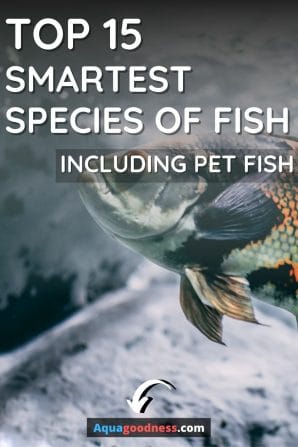
Table of Contents
1. Manta Rays
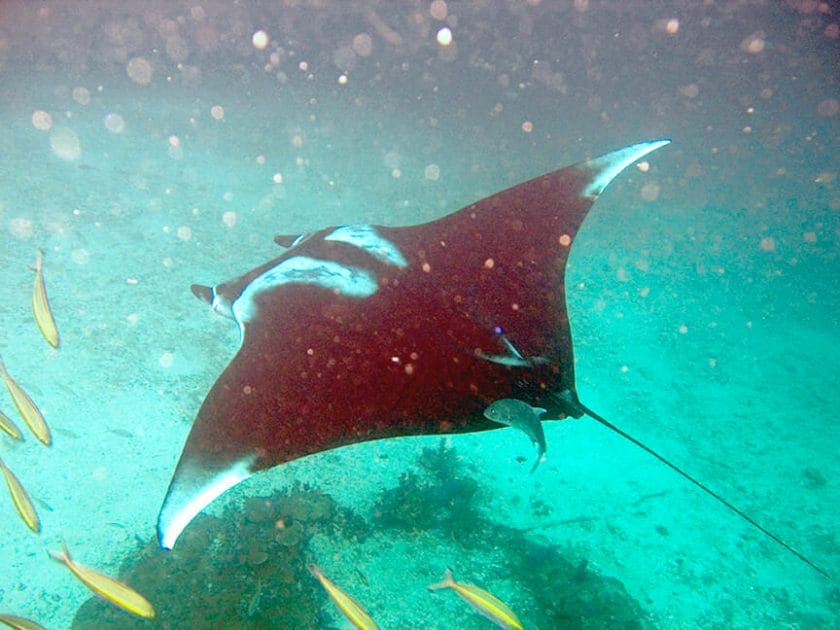
Image by jon hanson under CC BY-SA 2.0
| Pet Fish | No |
| Diet | Carnivore |
| Water Type | Saltwater |
| Care Level | N/A |
| Prefered Temperature | Not colder than 68° F |
| pH | 6.0 – 9.0 |
| Salinity | N/A |
| Water Hardness | N/A |
| Minimum Tank Size | N/A |
Manta rays are reputed as one of the most intelligent fish in the ocean. The brain of Manta rays is highly developed to solve problems, communicate, and learn about their environment.
Manta rays can manipulate objects to get food. They often entertain themselves with playful activities for fun. They are curious and usually keep a strong sense of community with other Manta rays.
Manta rays are also intelligent enough to remember the exact locations of coral reefs where they can find smaller sea creatures that feed on parasites, and dead skins to clean them. They often make trips to these spots, stay still for several minutes for the cleaning, and may return to the same spot regularly for cleaning.
Studies also show that they tend to have a retentive memory as they can remember locations through visible cues and scents.
2. (Black Spotted) Tuskfish
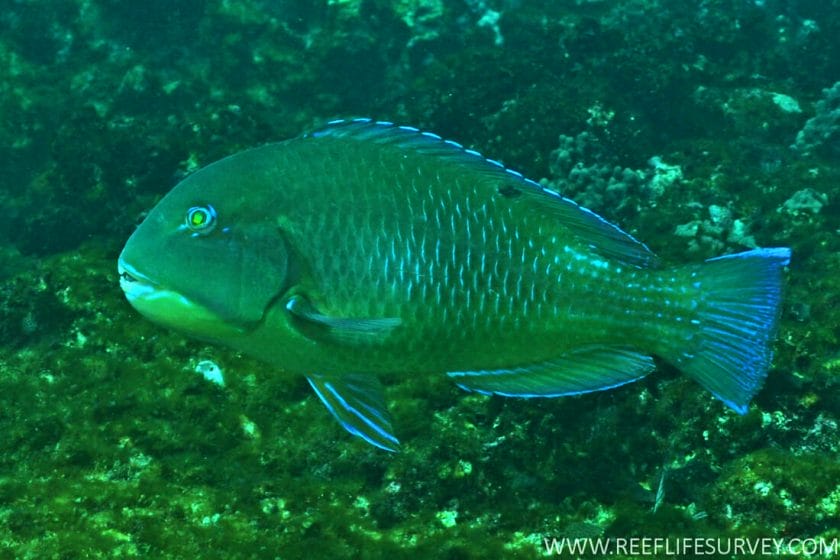
Image by Graham Edgar / Reef Life Survey under CC BY 3.0
| Pet Fish | Yes |
| Diet | Carnivore |
| Water type | Saltwater |
| Care Level | Moderate |
| Prefered Temperature | 72-78° F |
| Salinity | 1.023 – 1.026 |
| pH | 8.1 – 8.4 |
| Water Hardness | 8-12 dKH |
| Minimum Tank Size | 75 gallons |
An impressive hunting strategy is a sign of intelligence, but using tools is also a sign of intelligence.
Interestingly, the Black-spotted Tuskfish’s genius in using tools to find food earns it a place on this list of intelligent fish.
Proof of its intelligence is how it uses tools to find food. A diver once photographed the Black-spotted Tuskfish violently striking a clam against a rock in 2011. The fish aimed to break open the shell to eat the clam.
Since its diet consists mostly of animals that hide in the protective covers of their shells, such as clams, snails, and crustaceans, the black spotted Tuskfish holds the animal in its mouth, and strikes it at the rock until the shells break open.
This use of tools is proof of its cognitive ability as an intelligent fish.
3. Atlantic Salmon
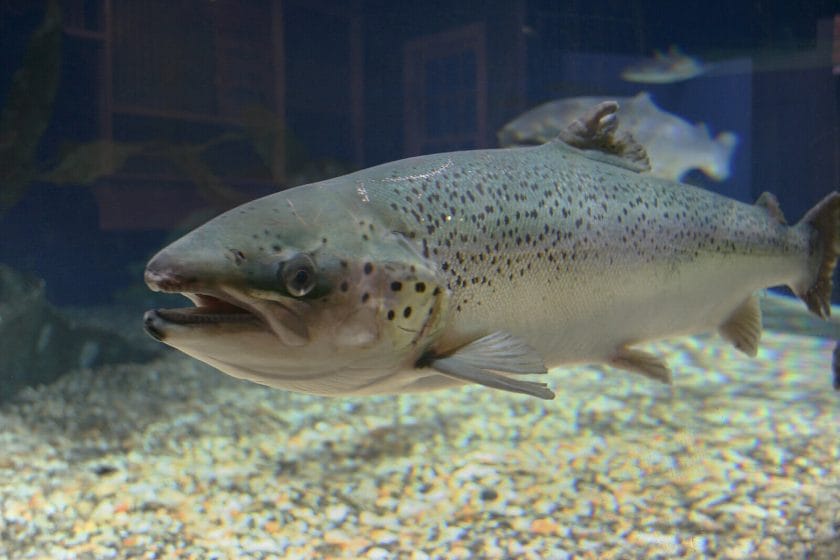
Image by Maritime Aquarium at Norwalk under CC BY-ND 2.0
| Pet Fish | No |
| Diet | Carnivore |
| Water type | Saltwater |
| Care Level | N/A |
| Prefered Temperature | N/A |
| Salinity | N/A |
| pH | 6.5 – 8.0 |
| Water Hardness | N/A |
| Minimum Tank Size | N/A |
One of the signs of intelligence in the Atlantic salmons is the ability to recall routes that lead to specific locations deep in the freshwater bodies where they spawn at precise periods.
Unlike Pacific salmon species, Atlantic salmons survive multiple reproductive cycles. But to reproduce, they must travel long distances into streams, and rivers during the spawning season. After spawning, they head out again into the open sea, and may have to swim hundreds of kilometers.
But the remarkable thing about this fish species is its ability to remember the routes spanning hundreds of kilometers between the oceans, and the freshwater bodies where they spawn during the spawning seasons.
Another evidence of intelligence in this species is that they are lifelong learners.
In a recent marine tracking research, Salmons from different rivers assembled before journeying through the narrow Strait of Belle Isle.
This is possible evidence of older salmons teaching the routes to younger salmons.
4. Elephant Nose Fish
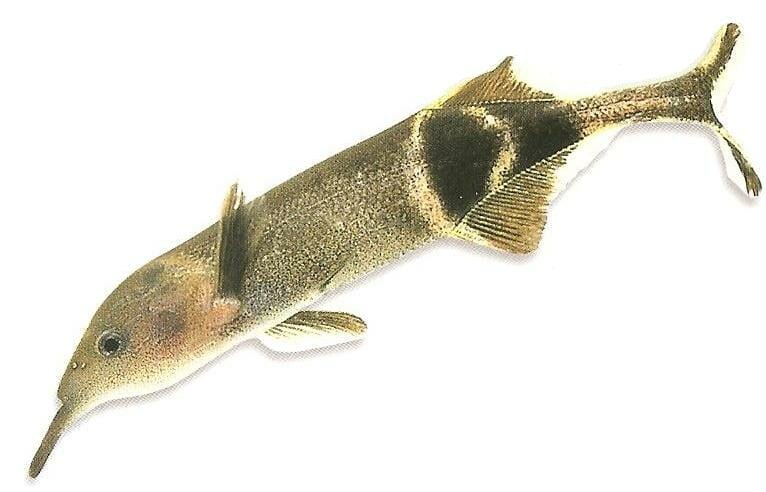
| Pet Fish | Yes |
| Diet | Carnivore |
| Water type | Freshwater |
| Care Level | Moderate/Difficult |
| Preferred Temperature | 79 – 82 °F |
| Salinity | N/A |
| pH | 6.8 -7.2 |
| Water Hardness | 5 – 15 dKH |
| Minimum Tank Size | 50 gallons |
Elephant nose fish is an electrogenic African fish that prefers freshwater. Of all vertebrates in the animal kingdom, it has the highest brain-to-body oxygen consumption ratio.
This fish can switch between electrical, and visual senses to locate objects in its immediate environment. The amazing thing about this ability is that this fish has a small brain.
With its electro-locators, elephant nose fish are smart enough to detect prey, and locate mates even in dark muddy waters.
One amazing thing about this fish is that it has a tiny brain, and no cortex. Other animals can normally navigate dark spaces, and locate objects in the dark with other senses, such as smell, hearing, and touch.
Tasks like this were thought to require the cerebral cortex, but Elephant nose fish can do all that even though it does not have a cortex.
In addition to this amazing ability, the fish can choose which sense to use depending on which is more favorable.
5. Archerfish
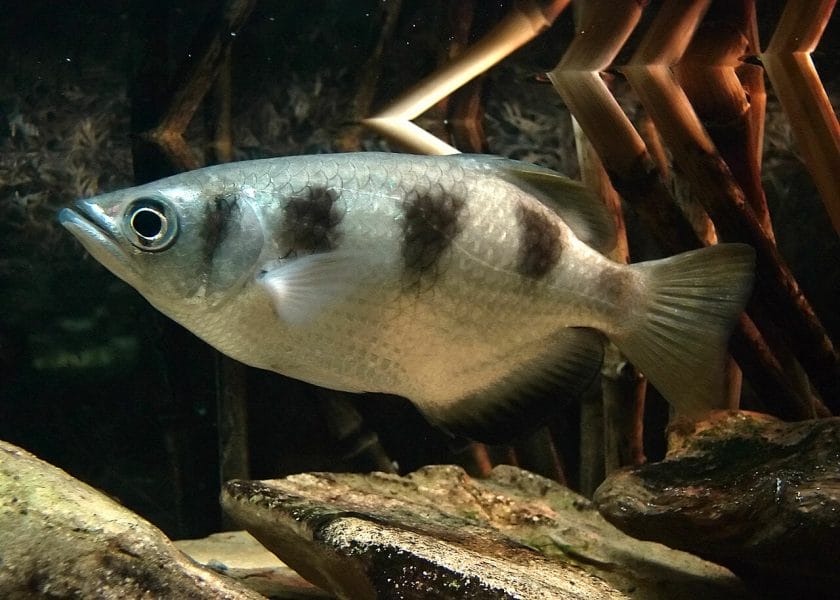
Image by Chrumps under CC BY-SA 3.0
| Pet Fish | Yes |
| Diet | Carnivore |
| Water type | Saltwater, brackish and freshwater |
| Care Level | Moderate |
| Preferred Temperature | 76 – 84° F |
| Salinity | 1.008 – 1.012 |
| pH | 7.0-8.0 |
| Water Hardness | 5 – 19 dGH |
| Minimum Tank Size | 55 gallons |
Archerfish is one of the most intelligent fish species on the planet. The archerfish is a smart fish that uses tools to hunt prey.
It is remarkable how it varies the speed of the water it shoots. Instead of shooting a ball of water, archerfish can change the speed so that it accumulates into a concentrated mass of water before it hits the prey. That requires some brainwork!
Besides the complex skill of shooting down prey with water streams, archerfish can also tell human faces apart.
This cognitive ability was discovered in a recent study. The archerfish recognized a 3D version of the human face at different angles.
This proves that archerfish have a considerably retentive memory, and intelligence, even though it took more time to recognize the face at higher rotation degrees.
6. Oscar Fish
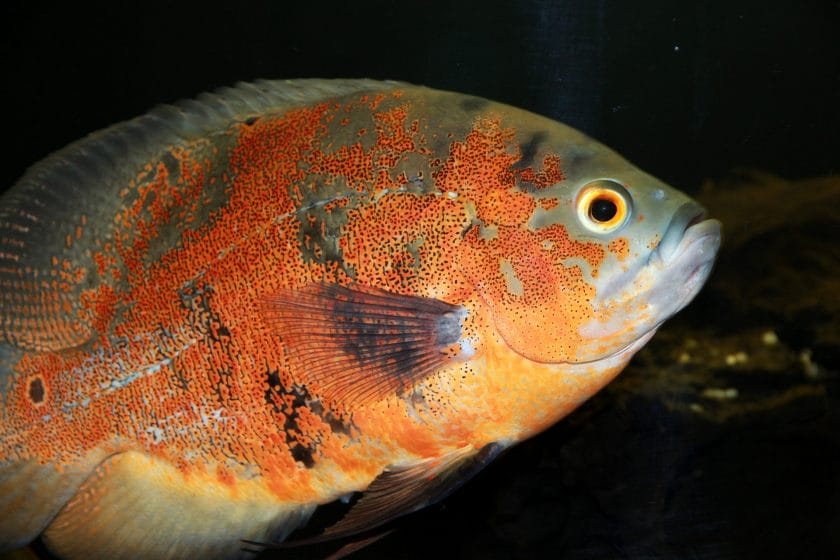
| Pet Fish | Yes |
| Diet | Carnivore |
| Water type | Freshwater |
| Care Level | Moderate |
| Preferred Temperature | 74 – 81 °F |
| Salinity | N/A |
| pH | 6 – 8 |
| Water Hardness | 5 – 20 dGH |
| Minimum Tank Size | 55 gallons |
Oscar fish are so smart that they are called water dogs in the fish-keeping hobby. As proof of their intelligence, they hardly swim aimlessly. When they swim, they tend to move for a reason.
Another proof of their intelligence is their ability to recognize, and even form emotional bonds with their owners. They can do this, especially by sight.
As proof of their emotional bond with their owners, many Oscars have been found to reject food from strangers. Some also get mad when strangers interact with their tanks.
Oscar fish tend to have a taste for how their tank should look. You may have noticed them rearrange their tanks to suit their taste.
Although they will dig the substrate, and uproot plants to lay their eggs, they also rearrange the rocks to suit their taste.
7. Pufferfish
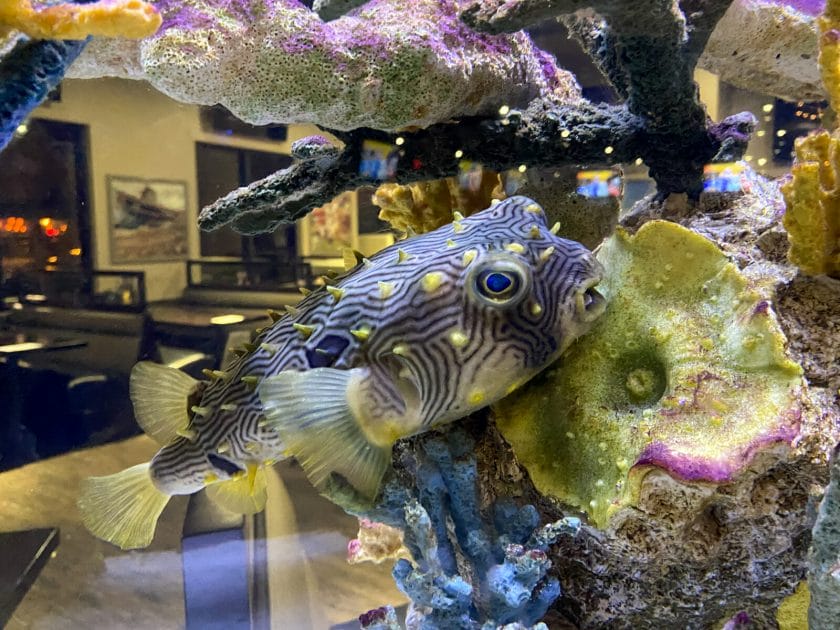
| Pet Fish | Yes |
| Diet | Carnivore |
| Water type | Saltwater |
| Care Level | Difficult |
| Preferred Temperature | 74 – 78° F |
| Salinity | Depends on the marine species (1.018 – 1.022) |
| pH | 7.0 – 7.6 |
| Water Hardness | 200 – 400 ppm |
| Minimum Tank Size | Depends on the marine species (30+ gallons |
Although not at the top of the smart fish list, pufferfish exhibit intelligence in several ways.
Some pufferfish species exhibit impressive hunting skills that emphasize their problem-solving abilities.
A ready example is the Golden puffer species, which often explores open waters to hunt for tiny crustaceans for food.
Another great example is stealth employed by the dwarf puffer species.
Other species, like the Congo pufferfish, specialize in ambushing their prey by burying themselves in the sand, waiting for unwary prey.
Apart from these stunning hunting skills employed by Pufferfish, they tend to recognize their owners.
8. Great White Shark
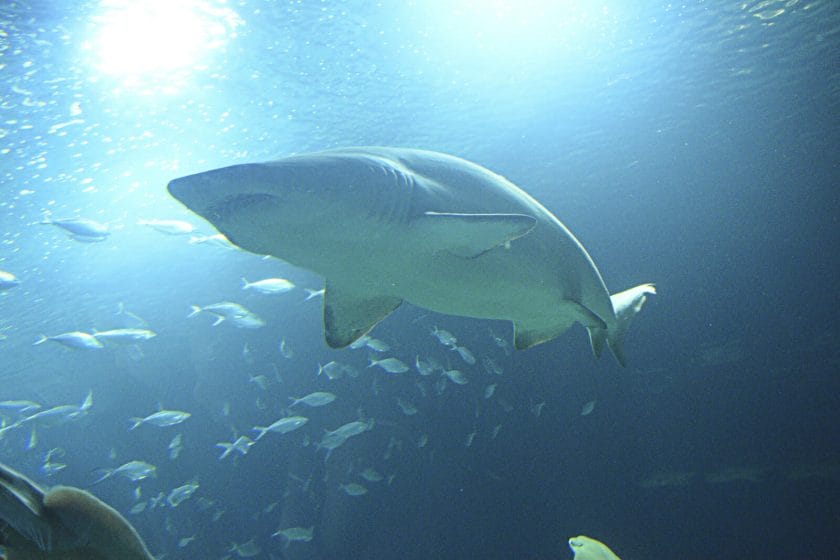
| Pet Fish | No |
| Diet | Carnivore |
| Water type | Saltwater |
| Care Level | N/A |
| Preferred Temperature | N/A |
| Salinity | N/A |
| pH | N/A |
| Water Hardness | N/A |
| Minimum Tank Size | N/A |
As intelligent creatures, proof of their intelligence includes their preferred hunting time, investigative nature, and ability to try to solve problems.
Great white sharks prefer hunting in the early dawn. This is because they get a higher chance of catching their seals since the seals can hardly see them coming from underneath.
They also inspect a wrangler while waiting for the wrangler to take his eyes off the bait.
They are smart enough to understand how the sun affects visibility, and when the reflection of the light makes it difficult to see them coming from beneath.
Wranglers often observe great white sharks swim around the bait for extended periods as they study the setting and the wrangler before deciding to act.
Great white sharks are also one rare species that raise their head out of the water to stare at prey.
9. Orcas
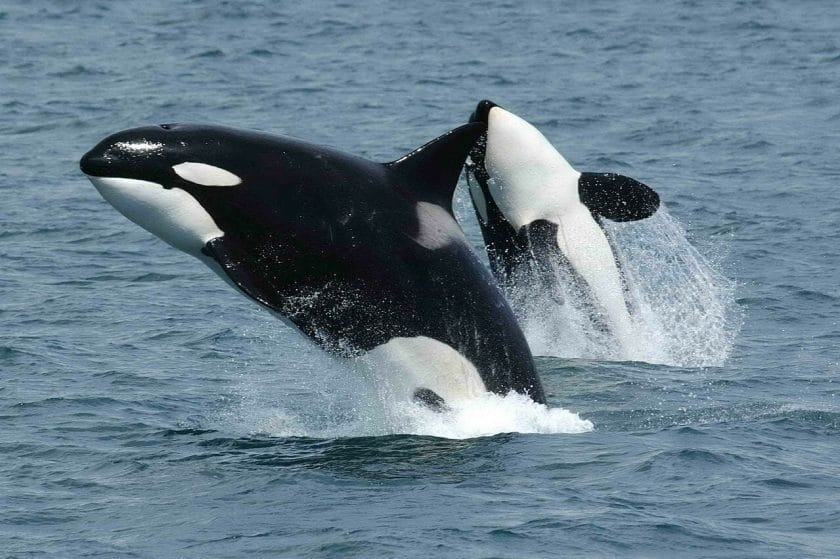
| Pet Fish | No |
| Diet | Carnivore |
| Water type | Saltwater |
| Care Level | N/A |
| Preferred Temperature | N/A |
| Salinity | N/A |
| pH | N/A |
| Water Hardness | N/A |
| Minimum Tank Size | N/A |
Orcas, also known as killer whales, are reputed to have the second-largest brains among marine mammals. Orcas are highly intelligent species that can learn about their environment quickly, and pass survival skills to their younger generations.
Orcas are smart enough to understand some basic physics principles to solve problems. This is evident in how they are known to create waves to knock off prey from a block of ice.
Another evidence of their problem-solving skill is how the Alaskan orcas steal fish from fishermen’s longlines. They also figure out the many techniques to prevent them from taking fish off the longlines.
Besides having a unique, and complex language system, researchers often relate amusing stories about how orcas playfully make fun of people for amusement. They often do this by repeatedly moving objects people try to reach.
10. Channel Catfish
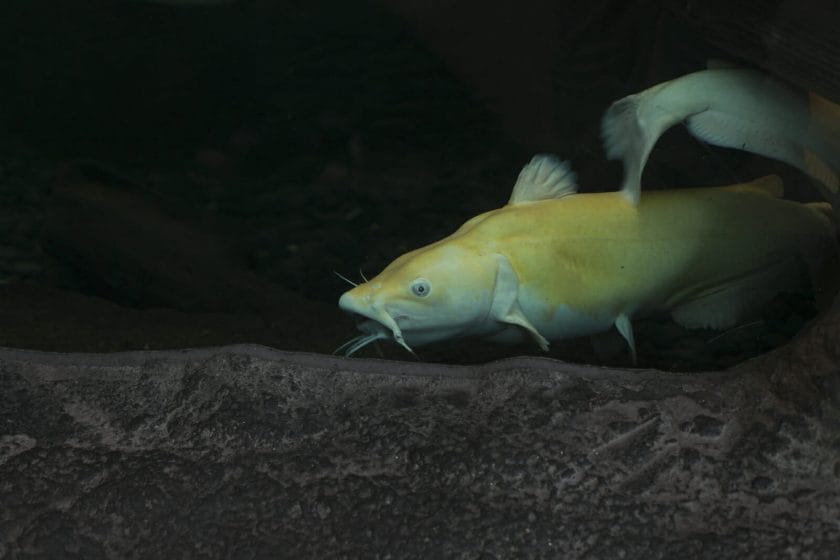
| Pet Fish | Yes |
| Diet | Omnivore |
| Water type | Freshwater (Thrives in brackish water) |
| Care Level | Moderate |
| Preferred Temperature | 75° and 85° F |
| Salinity | N/A |
| pH | 6 – 8 |
| Water Hardness | N/A |
| Minimum Tank Size | Depends on the species (30 gallons – 125+ gallons) |
Channel catfish are smart despite their simple brain structure, and size. Research continues to prove that this fish indeed has a retentive memory.
One of the fascinating things about the channel catfish is how it can recall the voice of the person who feeds it even after last hearing it five years ago.
Channel catfish also have a complex system of communication. They can tell the sex, age, reproductive stage, and even social hierarchy of another species member by producing, and recognizing specific pheromones.
They are also smart enough to distinguish between communication signals. They can tell an alarm signal that warns the group apart from an individual’s odor, signaling its identity.
11. Crimson Spotted Rainbow Fish
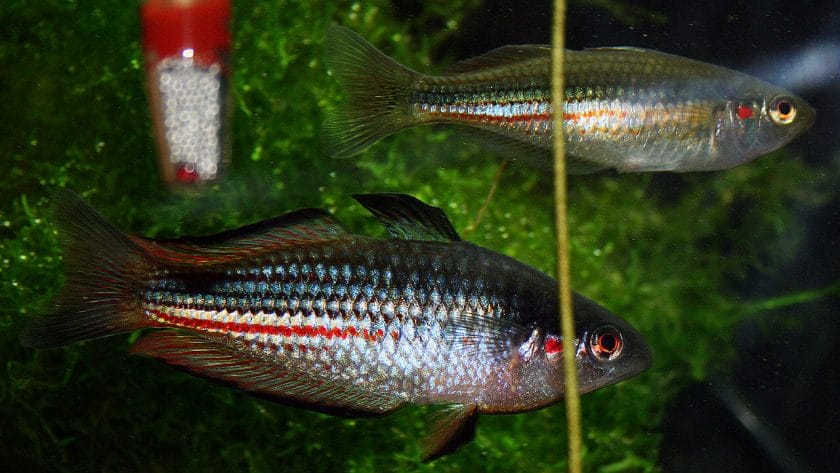
| Pet Fish | Yes |
| Diet | Carnivore |
| Water type | Freshwater |
| Care Level | Moderate |
| Preferred Temperature | 71.6 – 77°F |
| Salinity | N/A |
| pH | 6.5 – 7.5 |
| Water Hardness | 5 – 10 dGH |
| Minimum Tank Size | 30+ gallons |
Crimson-spotted rainbow fish display intelligence in several ways. One of the most impressive ways they show intelligence is their ability to recall locations with a mental map.
They usually avoid places where they had a bad adventure, and use landmarks to navigate the water.
This species is also reputed to be a good learner as it can be taught some problem-solving tricks. Remarkably they tend to remember the tricks as long as 11 months later.
One of the tricks they are usually quick to learn, and retain is how to avoid being caught with a net by swimming through the center hole.
This fish will recall how to escape a net the same way whenever it faces the threat of being caught by one.
12. Groupers and Moray Eels
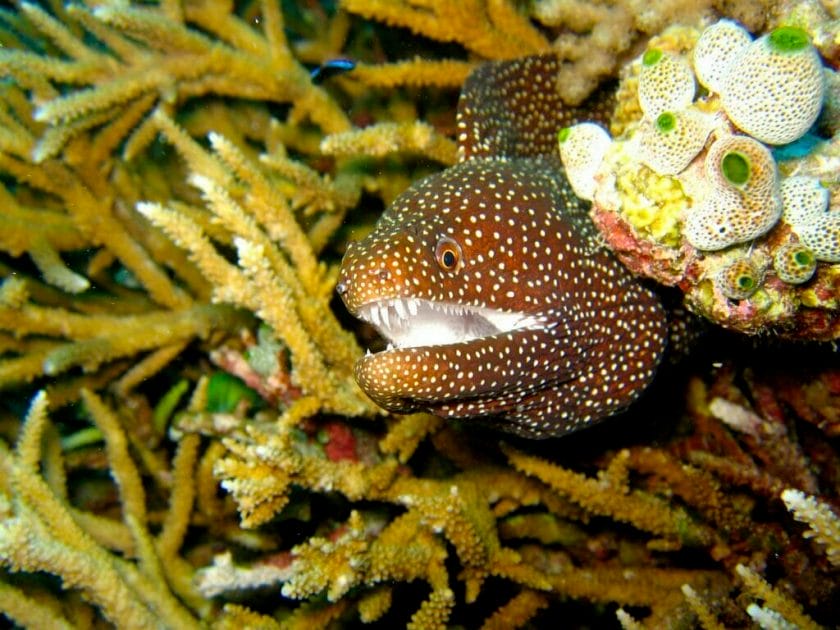
| Pet Fish | (Groupers) Yes / (Moray eels) Not all species |
| Diet | Carnivores |
| Water type | Saltwater |
| Care Level | (Groupers) Moderate / Moderate |
| Preferred Temperature | 77 – 81° F |
| Salinity | 1.021 – 1.023 |
| pH | 8.2 – 8.4 |
| Water Hardness | 8 – 10 dKH |
| Minimum Tank Size | 300 / 125+ gallons |
The ability of two distinct species to form an effective hunting party is a remarkable proof of the intelligence between them.
This is especially true of groupers and morays. Researchers observed that groupers deliberately visit, and invite the eels to hunt with visual signals. The groupers signal the eels by shaking their heads at a high frequency.
The eels respond by accepting the invitation, and swimming into the reef. Prey avoid groupers by hiding in crevices. But the moray eels lay waiting in the crevices to chase them back out or kill them for food.
The strategy also allows the eels to chase out prey from crevices into groupers waiting to ambush them in the open and vice versa.
But scientists also find that only the groupers signal the eels.
13. Goby Fish
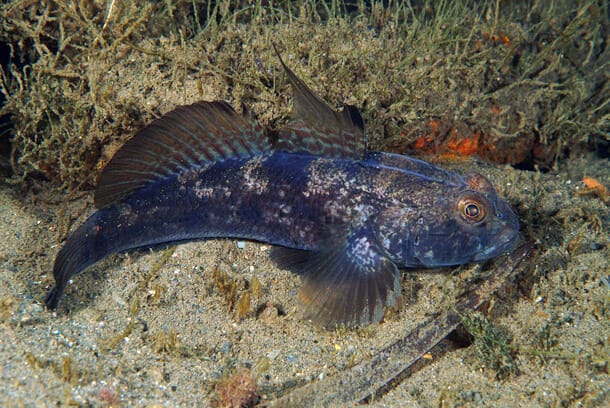
| Pet Fish | Yes |
| Diet | Carnivore |
| Water type | Saltwater |
| Care Level | Easy – Moderate |
| Preferred Temperature | 74 – 80°F |
| Salinity | 1.021 – 1.023 |
| pH | 7 – 8.5 |
| Water Hardness | 12 – 18 dH |
| Minimum Tank Size | 20+ gallons |
The ability to recognize each member of its group is one of the cognitive skills that make the goby fish intelligent.
However, a more interesting proof of their intelligence is their ability to form maps of spatial environments and recall the exact positions of pools. This is especially true of the rock gobies.
A recent study reveals that rock gobies’ brains differ from the species that live in the sand. Rock gobies’ brains have more gray matter devoted to spatial memory.
Rock gobies can form cognitive maps of rock pool positions to know exactly where to jump when threatened in a rock pool.
They can also recall these escape routes for as long as 40 days!
14. Dolphins
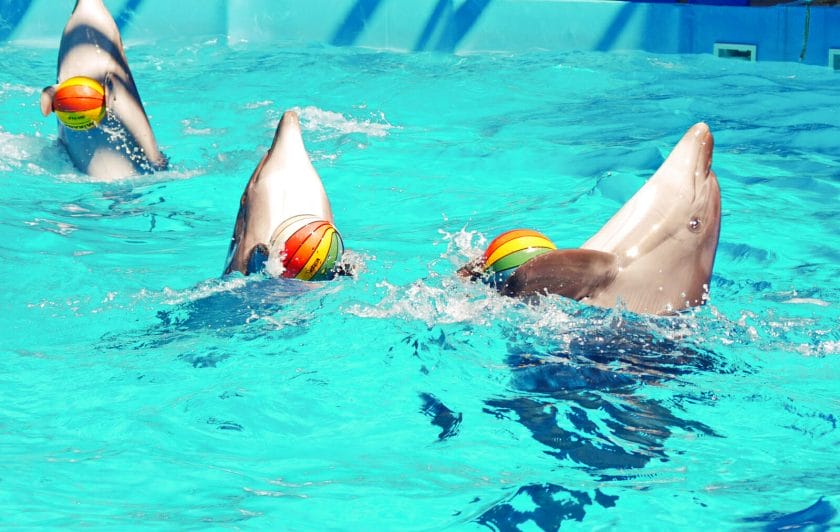
| Pet Fish | No |
| Diet | Carnivore |
| Water type | Saltwater |
| Care Level | N/A |
| Preferred Temperature | N/A |
| Salinity | N/A |
| pH | N/A |
| Water Hardness | N/A |
| Minimum Tank Size | N/A |
Scientists generally agree that dolphins are an intelligent species. Studies show that they cooperate to hunt as a group. Some dolphins circle the fish while others go in to grab some food.
They also have communication systems, and pass them down to younger generations.
Apart from these, dolphins have also demonstrated that they can clearly understand advanced language. Proof of this is how they respond to whistles, and signals after being trained to do the tasks accompanying that gesture.
Dolphins can grasp advanced forms of communication, and are physically aware of themselves. Proof of this physical awareness is that they pass the mirror test. They are aware of and recognize themselves in the mirror.
There have also been reports that suggest emotional awareness, and intelligence in dolphins. Dolphins grieve, and also experience happiness.
Fishermen once reported a distressed mother dolphin frantically signaling fishermen to save her calf snared in a net. After rescuing her calf, the fishermen were treated to impressive jumps by the overjoyed mother dolphin.
15. Clownfish
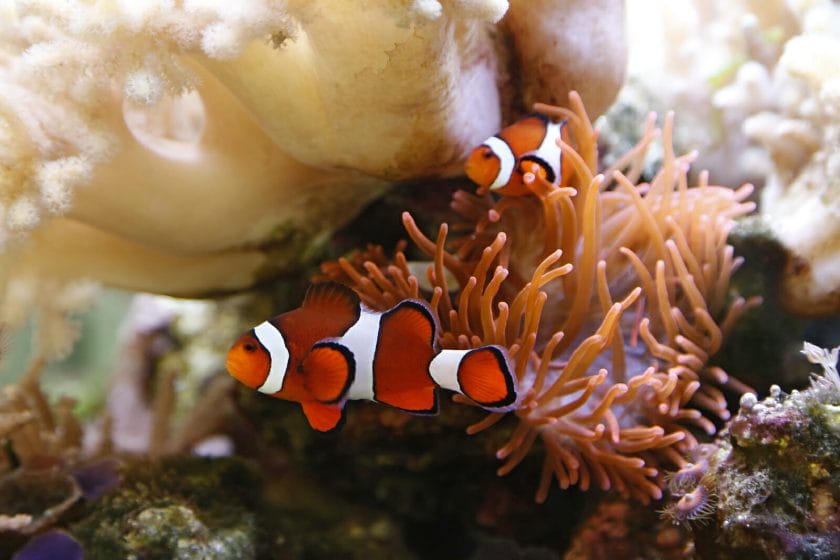
| Pet Fish | Yes |
| Diet | Omnivore |
| Water type | Saltwater |
| Care Level | Easy |
| Preferred Temperature | 74 – 79° F |
| Salinity | 1.020 – 1.024 |
| pH | 7.8 – 8.4 |
| Water Hardness | 7 – 12 dKH |
| Minimum Tank Size | 30+ gallons |
As proof of its retentive memory, the Red sea clownfish can remember their mates 30 days after separation from the home anemone.
Studies further show that clownfish have a system of communication. They make popping and clicking noises to communicate with other clownfish in the group.
Scientists also believe that chatter maintains the hierarchy in a group to prevent conflicts.
They also understand problems to an extent. Clownfish hardly swim too far from their host anemones for fear of losing the territory to another male.
Although this may be seen as territorial behavior, it is a sign of intelligence, as the clownfish can tell that another male may claim the territory if it goes too far from its host anemone.
FAQ
Can Fish Recognize Their Owners?
Many fish recognize their owners. Studies prove that many fish species can recognize the face of their owners among other distinct faces.
Some fish have been found to form a close bond with their owners, associating their presence with food, and even rejecting food from strangers.
Which Fish Has The Largest Brain?
The sperm whale is reputed as the fish with the largest brains. However, big brains in fish do not mean more intelligence.
In terms of brain-to-body weight ratio, the elephant nose fish has the largest brain. It still holds the position when compared with other vertebrates.
Conclusion
Fish are more intelligent than humans used to think, and science is uncovering this fact with further studies.
As an intelligent fish keeper, you will find it fun to keep a smart fish.
Many of the intelligent fish listed above can make your fish-keeping experience intriguing. Check the list out to pick the fish that suits your personality best.
You can also experience firsthand how the fish you choose recognizes your face, and display other signs of intelligence.
Oscar fish is one of the most intelligent fish that you can easily fish at your local fish store. It is also relatively easy to care for compared to other fish in this list.
If you are interested in keeping Oscar fish in your tank then please read this article to know about how to take care of them in your aquarium.